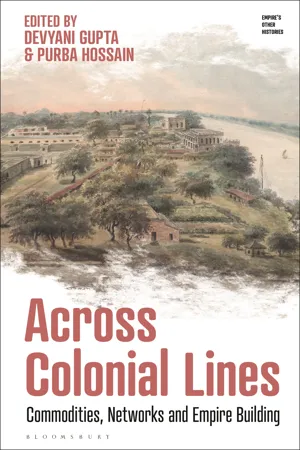
Across Colonial Lines
Commodities, Networks and Empire Building
- 256 pages
- English
- ePUB (mobile friendly)
- Available on iOS & Android
About This Book
Across Colonial Lines takes a multi-perspective approach to the study of empire and commodities, and encourages readers to look at commodity histories in alternative spatial and temporal contexts. It offers a comparative understanding of commodities in the Venetian, Portuguese, Dutch, French and British Empires. Highlighting the interwoven character of multiple commodity networks, this book situates commodities like gold, coffee, tea and indigo, to name a few, within pre-existing networks of labour, consumption and knowledge production. It explores the nexus between the local and the global, and highlights the role played by individual producers, petty traders, sailors and even consumers in creating regional circulations within a global political economy. In this volume, commodity networks are not just sites of production and trade, but also of political control, social organisation and consumption choices. They provide the impetus for globalisation from as early as the thirteenth century. Each chapter takes an individual commodity to illustrate the history of commodity transmission within imperial contexts. From early modern Venetian commerce to the trade networks of the Eurasian world; from the trading ambitions of British sailors to Portuguese global imperial ambitions; from the cross-imperial knowledge networks of indigo to the assertion of indigenous agency in Angola; and from the commodification of labour to the experience of tourism in the Caribbean and Indian Ocean World, Across Colonial Lines uses commodity networks as a lens to study empire building across varied yet connected geographies and chronologies.
Frequently asked questions
Information
Table of contents
- Cover
- Halftitle Page
- Title Page
- Contents
- List of illustrations
- List of tables
- List of contributors
- Acknowledgements
- Commodities, networks and empire building: An introduction
- 1 From commodity trade to ‘virtual’ empire: Venice in the twelfth to fifteenth centuries
- 2 West Africa, the Akan gold trade and Portugal’s global ambitions in the sixteenth century
- 3 Tea and empire in the Asian interior, c. 1750–1900
- 4 Sailors as traders: Early modern seafarers in commodity chains, commercial practices and empire
- 5 The social locations of colonial knowledge: Indigo in Bengal, Java and Senegal
- 6 What Angolans got for their coffee: Connecting histories of labour and consumption in colonial Africa, c. 1860–1960
- 7 ‘Docile, quiet, orderly’: Indian indenture trade and the ideal labourer
- 8 Globalization gothic: Unpacking the commodity fetish in Caribbean tourism
- Conclusion: The chains of empire: Some thoughts on commodity history as method
- Selected bibliography
- Index
- Imprint